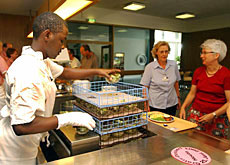Asylum clampdown sparks fear of rising crime

The mayor of Switzerland’s largest city, Zurich, has warned that the government’s plans for stricter asylum laws will lead to an increase in urban crime.
In an interview with swissinfo, Elmar Ledergerber also said Swiss towns and cities felt shut out of the national debate on how to tackle illegal immigration.
Parliament is currently discussing a series of measures aimed at restricting immigration and asylum procedures.
Last week the city of Zurich organised a one-day conference on asylum, during which representatives from 100 towns, cities and social welfare organisations across the country called on the federal authorities to listen to their concerns.
Zurich has taken a leading role in the immigration debate and in 2003 launched a pilot community work project for asylum seekers living in the city.
The conference was held less than six months after new measures came into force stopping welfare payments for asylum seekers whose applications have been turned down.
Last week a report by the Federal Refugee Office revealed that most of the nearly 1,500 asylum applicants refused entry between April 1 and July 31 had disappeared.
Ledergerber said it was inevitable that rejected asylum seekers would go underground and that the country’s cities could not simply turn their backs on them.
swissinfo: Swiss cities say they feel “excluded” from discussions on asylum issues, which are led by the federal government and the cantons. Is this the case?
Elmar Ledergeber: Yes, it is really is. Swiss cities simply do not exist when it comes to politics at a federal level. It is up to us to enforce regulations adopted by the government and parliament in Bern. But we are not really included in the process of developing strategies and solutions.
swissinfo: How would you like to see cities and towns included in the debate?
E.L.: We should be included in a kind of consulting group or in workshops where we could share our experiences, our view of the problems and suggestions for how they could be solved.
I’m not saying that hundreds of representatives from towns and cities should go to Bern, but I do think that a delegation should be invited to the federal capital when a debate such as the one on asylum is initiated.
swissinfo: What do you think will be the consequences of moves at a federal level to tighten the country’s immigration laws?
E.L.: Well, we fear – and we have some experience in this field – that by tightening the laws, many of those looking to stay in Switzerland will go underground [and] it will no longer be possible to track them. They will live in our cities and some may even be forced to survive by committing minor criminal acts. And at the end of the day it will be up to us to solve and pay for these problems.
swissinfo: Last year the city of Zurich launched a pilot community work programme for asylum seekers. Critics say it is just a means of providing cheap labour…
E.L.: This is completely wrong. It was never our intention to find free or cheap labour for work that needs to be done.
What we did find is that we had hundreds of people in the city who had nothing to do but stand around at the railway station or on the streets and this was causing a lot of bad feeling. So we thought that if they could be found some work that needed to be done, they would be perceived differently by local residents. And we discovered that [those who worked on the programme] were accepted as… members of the community.
So the scheme has worked as a means of integration, of dealing with [asylum applicants] as human beings and giving them the opportunity to show that they do not only want our money and hospitality, but that they are also willing to give something back.
swissinfo: The pilot project runs until the end of the year. What happens next?
E.L.: We are now evaluating the benefits and disadvantages of the project. The city council will discuss this in detail, possibly in October, before deciding if the programme should be continued.
I also think that canton Zurich and the federal authorities should provide us with some assistance, at least in financial terms.
swissinfo: Have other cities or cantons expressed an interest in introducing similar community work programmes?
E.L.: Yes. Many places have already picked up on this kind of project. They are also offering [short-term] work placements to asylum seekers, and from what we have heard the experiences elsewhere have been very successful.
swissinfo: Earlier this year the federal authorities introduced new measures stopping welfare payments for asylum seekers whose applications have been turned down. What impact has this had in Zurich?
E.L.: The impact has been exactly as we feared. Many of these people have not left the country [as the government had hoped would happen] but just gone underground. They remain in our cities, and if they are really hungry or have problems it is up to our social welfare services to help them. We have to abide by international human rights laws and cannot simply [turn our backs on] this obligation.
The political decisions taken at a national level have created problems in cities and we are not at all happy about this. The federal authorities have completely misjudged the problem if they think that just by [bringing in new restrictions] they can get rid of these people. The fact is that asylum seekers are here, we have to deal with them and we need to find pragmatic solutions.
swissinfo-interview: Katalin Fekete in Zurich
A pilot project offering work for asylum seekers was launched in Zurich in April 2003.
About 200 asylum seekers have so far taken part in the project and received a “motivational” payment of around SFr210 ($165) per month for working in the city’s nursing homes, schools and parks.
The scheme sparked controversy because federal regulations ban asylum seekers from working during their first three to six months in the country (depending on the canton).
According to the Federal Refugee Office, there were 62,505 asylum seekers in Switzerland at the end of June 2004 – the lowest level since 1990.
The House of Representatives – one of Switzerland’s two parliamentary chambers – has voted in favour of stricter immigration and asylum procedures.
At a conference organised by the city of Zurich last week, 100 towns, cities and social welfare organisations demanded more of a say in the debate on how to combat illegal immigration.

In compliance with the JTI standards
More: SWI swissinfo.ch certified by the Journalism Trust Initiative


You can find an overview of ongoing debates with our journalists here. Please join us!
If you want to start a conversation about a topic raised in this article or want to report factual errors, email us at english@swissinfo.ch.